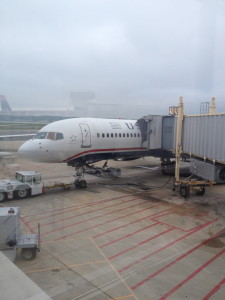Should Airline Crew be Allowed to Text During Flight?

Airline passengers are accustomed to the announcement to power off all electronic devices during take-off and landing, and to set cell phones on “airplane mode” during the rest of the flight.
How is it, then, that the pilot in a 2011 helicopter crash was found to have been texting during an ill-fated flight that killed the pilot and his 3 passengers?
Airport injury lawyer Doug Landau believes that in addition to applying to passengers, the “no electronics” rule should also be in place for pilots and crew operating an aircraft.
A texting airline pilot or crew member exposes the craft to danger, albeit in a different way than does a texting automobile driver.
When the driver of a car is distracted by texting, the problem is immediate: the driver takes her eyes off the road for several seconds, just enough time to cause a serious crash. But in the case of this helicopter crash, the pilot’s texting was not found to have been the specific cause of the accident. Instead, the pilot’s texting caused him to multitask, which distracted him from the important jobs of prepping the copter for flight, detecting problems in-flight, and safely flying the craft.
Much like an office worker who sets off on a task, but is interrupted by a text or phone call and then never returns to the job at hand, this pilot’s multitasking distracted him and prevented him from completing critical safety checks and routines. Ultimately, the cause of the crash was found to be (among other things) insufficient fuel, something the pilot should have detected during flight preparations. Read more about the crash here.
If you or someone you know has been involved in an aircraft crash involving a distracted pilot or crew and there are questions as to what laws apply, email or call Abrams Landau, Ltd. at once (703-796-9555).
